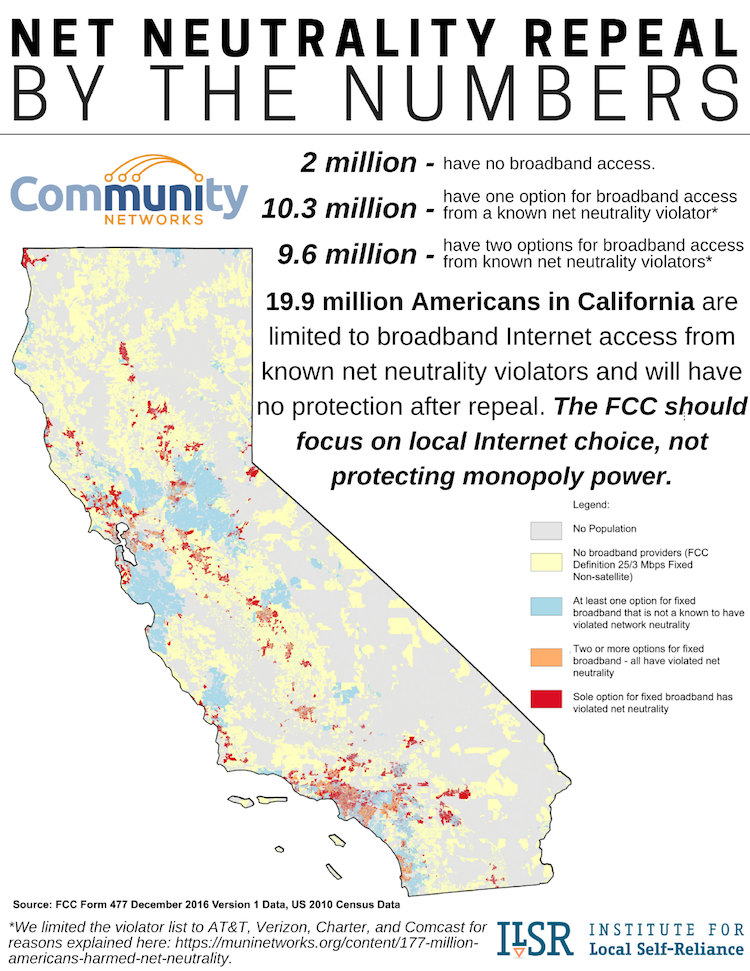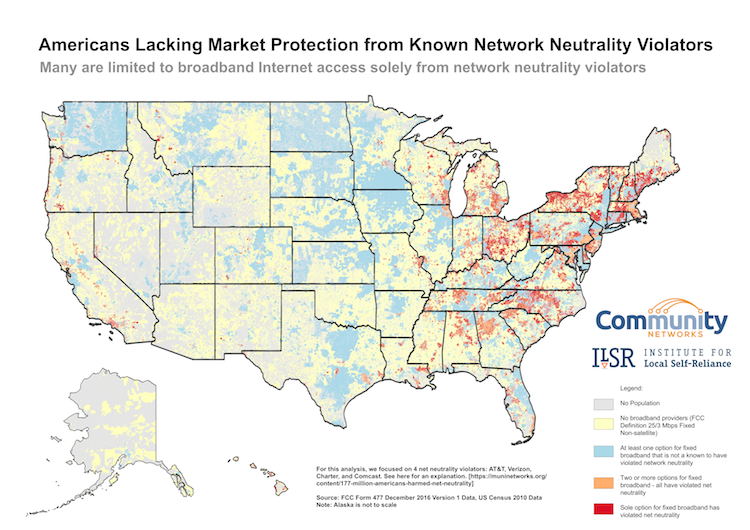
Fast, affordable Internet access for all.

On December 14th, FCC Chair Ajit Pai and the Republican Commissioners voted to present a huge holiday gift to big ISPs by dismantling network neutrality, despite outcries from the American people. When we examined FCC data to determine how many Americans would be left without market protections from known network neutrality violators, the numbers were discouraging. Now we’ve reached into the weeds to analyze the numbers on a statewide basis.
Percentage Of Population
The results reveal that a significant percentage of Americans will be limited to Internet access only from large monopolies that have a history of violating network neutrality and very strong incentives to abuse their market power.
Some states with higher population benefit slightly from competition relative to others — compare Florida’s 40 percent to 65 percent in Pennsylvania — but this also reflects the anti-competitive nature of big ISPs that tend to cordon off sections of the country and respectfully stay within their zones. Other, more rural states, such as Wisconsin at 66 percent, have few options because national ISPs just aren’t interested in serving areas where population is sparse and the pay-off is a long time coming. Lack of competition means high probability of service from one of the big four known violators in our study — AT&T, Verizon, Comcast, and Charter.
In this chart, we've listed states in order of greatest percentage of impacted population:
In addition to shredding network neutrality, the FCC is making it more difficult for us to obtain high-quality Internet access. Under the Obama administration, the FCC raised standards for broadband, but the new administration is set on driving us backward. Chairman Ajit Pai and the other Republicans in the FCC want to equate mobile Internet service with home connections. They also want to revert to a slower definition of broadband. We have to show them that their plan is ludicrous and shortsighted; the #MobileOnly Challenge is a start.
What Is The #MobileOnly Challenge?
It seems as if Pai and his chums aren’t aware of what it’s like to depend solely on a mobile connection, especially for people in places where mobile service is spotty or slow. In order to share the experience, the Institute for Local Self-Reliance, along with nine other organizations and FCC Commissioners Clyburn and Rosenworcel, are supporting the #MobileOnly Challenge.
For one day in January, participants will put away their laptops and use only their smartphones to access the Internet. During the day, they will report on their experience via social media with #MobileOnly in the tweet, FB post, Instagram post, or other notification about the experience.
The FCC expects to vote on the mobile Internet access and broadband definition question by February 2, 2018. Right now, the Commission defines broadband as 25 Mbps download and 3 Mbps upload; they want to redefine that speed to 10 Mbps/1 Mbps. January will be the time to let them know that we don’t want a slower Internet — we want an Internet for the future.
How Do I Do It?
Choose one day in January to take the challenge and on that day use ONLY your mobile device to access the Internet. During that day, share your experiences on social media using #MobileOnly. When your day is over, encourage your friends to also take the challenge. Don’t forget to contact @FCC during and after your challenge to let them know that mobile only is inadequate for Americans in the 21st century.
Get More Info, Spread The Word
Update 12/22/2017: Original maps generated on December 11th and used for these fact sheets understated the population of Americans forced to obtain services from known network neutrality violators. The problem is even greater than we originally calculated. We've update our maps and our fact sheets to reflect the more accurate data.
Network neutrality protects Americans from the ability of powerful ISPs to exercise unchecked power over what subscribers access and how quickly they receive certain content. The neutral characteristic of the Internet is one of its finest qualities. If Republican FCC Commissioners and Chairman Ajit Pai vote to shred network neutrality on December 14th as they’ve indicated, 177 million Americans will be left to the whims of a flawed market.
Mapping It Out, Presenting The Fact (Sheets)
We recently presented visualizations based on FCC Form 477 data that supports our findings on the way the repeal will limit vast swaths of people to a bleak Internet access future. Nationwide, approximately 29 million people have no broadband Internet access. Another 129 million will have no ability to change Internet access providers because there is no other option. Out of those folks, 48 million are forced to take service from an ISP that is a known network neutrality violator. Likewise, 146 million may have a choice between two ISPs, but about 52 million must choose between two network neutrality violators that have actively worked to undermine the policy for years.
Our team also parsed out the numbers for California and the East Coast from Maine to Virginia. The results are just as discouraging.
In our fact sheets, we focused on the number of people who either have no broadband access or who will be forced to take service from a firm that is a known violator of network neutrality. We've included our maps to help illustrate just how pervasive this problem is in each region.
Update 12/20/2017: Original maps generated on December 11th understated the population of Americans forced to obtain services from known network neutrality violators. The problem is even greater than we originally calculated, particularly in New York. End update.
This Thursday, December 14th, the FCC plans to remove network neutrality protections. Republican Commissioners and Chairman Ajit Pai justify the decision by claiming that the market will naturally protect subscribers from predatory big ISP behavior. Unfortunately, the FCC’s own numbers disprove their theory. We dug into the data that reveals how 177 million Americans will be left without any market protection following net neutrality repeal.
Visualizing The Data
Using FCC 477 data, we created a visualization of relevant data. This map focuses on the people and businesses at greatest risk - where they are limited to options from providers that have violated network neutrality in the past or have admitted the plans to violate it in the future.

For a larger image, download this version [18 MB png].
Download Net Neutrality Repeal By The Numbers, U.S.A. Edition, fact sheet here.
The results are not inspiring. More than 129 million people are limited to a single provider for broadband Internet access using the FCC definition of 25 Mbps download and 3 Mbps upload. Out of those 129 million Americans, about 52 million must obtain Internet access from a company that has violated network neutrality protections in the past and continues to undermine the policy today.
During the Obama administration, the FCC under Chairman Tom Wheeler made bold steps to protect innovation and competition on the Internet by passing network neutrality rules. With new FCC Chairman Ajit Pai, network neutrality is in danger. In order to prevent the backward slide - or worse - we all need to comment to the FCC and tell them to preserve network neutrality protections.
Stepping Back In Time
Under Chairman Wheeler, regulations were put into place that prevented ISPs like Comcast, Verizon, and AT&T from slowing down specific websites or charging extra fees to certain sites, who then must pass along those fees to customers. Rather then turning the Internet into just another version of Cable TV, the FCC has preserved its neutrality - now those actions are at risk.
Chairman Pai announced soon after he was appointed that he wants to roll back the rules implemented during the Obama administration, which includes eliminating “Title II” of the Communications Act protections for broadband. Title II provides the legal basis that prevents blocking and throttling.
Let's Act
On May 18th, the FCC released a Notice of Proposed Rule Making (NPRM); comments are due July 17th. What does the mean? It means it’s time for you to contact the FCC here (Proceeding 17-108) and let them know that you want in network neutrality and that you believe existing rules should stay in place.
If you’ve never commented on an FCC proceeding, here’s an article from Gigi Sohn, former Counselor to Tom Wheeler, who can offer some tips on an effective comment. You can also read some of the other comments submitted by others.
On March 24th, Christopher was on episode 232 of the web show "This Week in Enterprise Tech." Christopher discussed the future of community broadband networks in the Trump era as well as shared information about the models of successful networks across the country.
Christopher begins his discussion of these issues at 29:45 with host Friar Robert Ballecer and guest co-hosts Lou Maresca and Brian Chee. Throughout the show, the group covers the beginning of the FCC Chairmanship of Ajit Pai, how the Senate is legislating against Internet privacy regulations, and how community networks are pushing ahead to achieve better connectivity for local businesses and residents.
The folks at TWiT.tv share excerpts from our video on Ammon, Idaho, and the guys get into a deeper discussion about the possibilities of local empowerment from community networks.
You can stream the episode at TWiT.tv, or watch here: